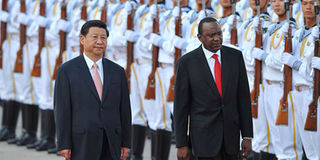Let’s get to know the mythical elephant

Chinese President Xi Jinping (left) and Kenya's President Uhuru Kenyatta inspect Chinese honour guards during a welcoming ceremony outside the Great Hall of the People in Beijing on August 19, 2013. PHOTO | WANG ZHAO | AFP
What you need to know:
- China should be more proactive in explaining and demonstrating its intentions and ability to partner with African countries.
- It is through active multidisciplinary approach that arising insights can be translated into policy actions for better outcomes.
An ancient Asian fable tells a story of four blind men who were deeply fascinated by the elephant.
Though incapable of seeing, each held an opinion about what an elephant looked like, based on the stories they heard.
One day, they were led to an elephant. The first touched the side and declared that it was like a wall. The one who touched the pointed tusk cried out that it was like a spear.
A third touched one of the legs and said it was an oversized cow. The last one held the tail; it was like an old rope!
As they argued over what an elephant looked like, almost to the point of breaking into a fist fight, a wise man hushed them, asking, “How can any of you be so certain you are right?”
The relationship between China and many African countries, including Kenya, can be likened to the mythical elephant.
Located 7,889 kilometres away, China was virtually cut off from the continent. While contact between Kenya and the People’s Republic of China can be traced back to the Ming Dynasty (1368-1644), when the renowned Chinese navigator Zheng He visited the East African country four times, formal diplomatic relations between the two were established on December 14, 1963.
STRATEGIC PARTNERSHIP
The cooperation, however, assumed fast flight from 1978, when Beijing rolled out the opening up and reform policy under President Deng Xiaoping, which catalysed China’s endogenous economic transformation from an inward-looking agricultural polity to the largest economy in purchasing power parity terms. This acted as a springboard to closer economic ties with Kenya.
From 20 at the turn of the century, over 400 Chinese firms have invested in Kenya, providing gainful employment to 50,000 Kenyans.
The volume of trade increased from $186 million in 2002 to $5.3 billion in 2018, making China Kenya’s top partner in terms of trade, investments, construction and development financier.
Cultural cooperation has also intensified. From as few as 58 Kenyans pursuing higher education in China in 2002, there are more than 2,400.
Beijing has also elevated its relationship with Nairobi to comprehensive strategic partnership, signalling a long-term, multifaceted stable relations.
Yet in the backdrop of these developments, China remains mysterious to many Kenyans. Some have heard about it. Others have been to China and experienced Chinese culture firsthand.
Yet others earn their daily bread from the Chinese enterprises locally. Many owe thriving businesses to their ties with China.
APPROACH
A section of Kenyans blame China for the huge debt owed by the government. Yet others hold that were it not for economic cooperation, Kenya would not have realised some infrastructure projects.
How can the two countries reconcile these divergent perceptions and create a more balanced, beneficial and sustainable cooperation?
The first step is to create a knowledge-driven understanding of the two societies. They should promote mutual appreciation, nuanced around worldviews, socio-economic and political organising and history.
The inaugural annual conference of China-Africa relations organised by the University of Nairobi last October allowed scholars, diplomats and government officials to ventilate on a broad range of issues.
It is from such active multidisciplinary approach that arising insights can be translated into policy actions for better outcomes.
Kenya has also listed Mandarin as an optional foreign language alongside French, Arabic and German. According to the United Nations Educational Scientific and Cultural Organisation (Unesco), Mandarin is the most widely spoken language. Fluency in the language will enable Kenyans to better engage and negotiate with China.
PUBLIC DIPLOMACY
Additional initiatives - such as exchange of media content, interaction through the Confucius Institutes at the University of Nairobi, Kenyatta University, Egerton University and Moi University- are under way.
On the flipside, as a rising power with global ambitions, China should be more proactive in explaining and demonstrating its intentions and ability to partner with African countries.
A large part of the misunderstanding could be a gap in information dissemination. An informed public diplomacy that goes beyond the formal government relations and mirrors socioeconomic and political aspirations of Kenyans is critical.
Like the elephant, China has had positive contributions to Kenya’s development agenda. Equally, the relationship has faced challenges.
But such is the nature of international relations. Conscious efforts by the two countries to amplify what works while finding recourse to the grey areas should take precedent.
Mr Cavince is a PhD student of international relations. [email protected] @Cavinceworld





